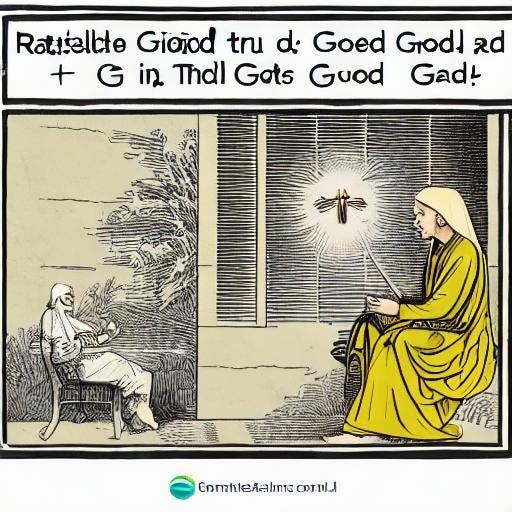Science vs. Religion
On one side it is hypothesized that there is no God. On the other side it is hypothesized that there is a God. The theist’s position is less clear than the position of the atheist. The theist certainly means that there is a conscious being who governs the Universe, but beyond that it is hard to say what exactly God is. Atheists sometimes satirize belief in God as belief in a magical white-bearded sky man, and they say that science has disproven the existence of such a sky man. But belief in God is certainly not the belief that a magic sky man built oceans and mountain ranges, and the sun and the moon. It is hard to articulate what exactly the believer in God believes, but it is something like a strong sense that there is more than just the material world, and that our lives are part of a deep drama that is not articulable purely in the terms of material substance.

The Problem of Evil
Another objection to the existence of God is the Problem of Evil. The solution to the Problem of Evil is that struggle and adventure are inherently good. The Problem of Evil seems to posit that there could be a world without any hardship. What would that even mean? A world without hardship sounds like a world of infants who float from one pleasurable experience to the next, a world of instant gratification, without even the need to exert oneself in order to ensure that the perpetual feast will continue. A world without hardship would be a world with nothing to struggle for, nothing to accomplish, nothing to fear, nothing to anticipate. A good God would not make us perpetual children inside a safe walled garden. Without anything to overcome, we could have no achievement.
The Task of the Theist
Over the last three centuries the industrialized world has lost its religion. There are still churches of course, and many of them even have robust attendance, but even in those churches there is no escape from the pervasive atheist emptiness of modern culture because the members of those congregations no longer believe that their faith is rationally justified. Either they explicitly reject reason (like the Evangelicals), or they continue to go to mass, but they do not embrace their religion with their whole self, because they have compartmentalized their religion in one part of their minds, and their rational, analytical faculties in another part of their minds, applied to the tasks of living, outside of church. All their capacity to figure things out, their curiosity, their ability to plan, their mental prowess, the fierce conviction that one has in propositions which one has worked out for oneself, are applied to matters of daily life, never to matters of the spirit. They are willing to entertain the very strong empirical claims of Christianity1 because they think that atheism is false, not because they think Christianity is true.
I am not saying that those Christians are insincere. They certainly are not closet atheists. They believe that atheism is not true because they sense the problems with atheism which I identified at the start of this essay. They have a sense that the material world is not everything and that some kind of God exists - and they think they are satisfactorily addressing those intuitions by adhering to the religion of their ancestors, going to church every Sunday, and affirming Christianity in front of their children. The humility to admit that you do not know everything is certainly not hypocrisy.
But religious practice without rational content is not enough. A religious attitude like that produces children who have no religious sensibility at all, and adults who, after a long time of practicing liturgy without really believing in any reason for doing it, find that they themselves can no longer remember why they thought religious practice was important - and who suspect that it was just habit all along, and who see their children sidelining religion, their grandchildren ignoring it completely, who see religious practice dying with themselves and who do not strongly feel - or cannot remember why they would feel - that anything is really being lost.
The churches (some of them) should be commended for having by means of ritual kept some sense of the transcendent alive among some people, but as they have abandoned reason, they have lost the fire of true conviction.
The task of the Theist is to know God through pure reason, and to build up the bodies of theology and ritual which together with rationalist religious beliefs are necessary to fill the spiritual void which has been left by the decline of Christianity.
e.g. that God appeared to some shepherds in a burning bush 2500 years ago, that the creation story of one tribe was divinely inspired truth and the creation stories of every other tribe were empty fairy tales.





